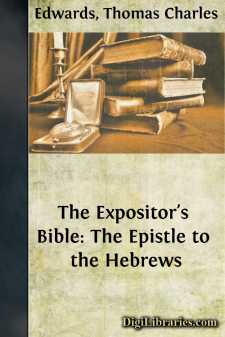Categories
- Antiques & Collectibles 13
- Architecture 36
- Art 48
- Bibles 22
- Biography & Autobiography 813
- Body, Mind & Spirit 142
- Business & Economics 28
- Children's Books 14
- Children's Fiction 11
- Computers 4
- Cooking 94
- Crafts & Hobbies 4
- Drama 346
- Education 46
- Family & Relationships 57
- Fiction 11829
- Games 19
- Gardening 17
- Health & Fitness 34
- History 1377
- House & Home 1
- Humor 147
- Juvenile Fiction 1873
- Juvenile Nonfiction 202
- Language Arts & Disciplines 88
- Law 16
- Literary Collections 686
- Literary Criticism 179
- Mathematics 13
- Medical 41
- Music 40
- Nature 179
- Non-Classifiable 1768
- Performing Arts 7
- Periodicals 1453
- Philosophy 64
- Photography 2
- Poetry 896
- Political Science 203
- Psychology 42
- Reference 154
- Religion 513
- Science 126
- Self-Help 84
- Social Science 81
- Sports & Recreation 34
- Study Aids 3
- Technology & Engineering 59
- Transportation 23
- Travel 463
- True Crime 29
The Expositor's Bible: The Epistle to the Hebrews
Description:
Excerpt
CHAPTER I.
THE REVELATION IN A SON.
“God, having of old time spoken unto the fathers in the prophets by divers portions and in divers manners, hath at the end of these days spoken unto us in His Son, Whom He appointed Heir of all things, through Whom also He made the worlds; Who being the effulgence of His glory, and the very image of His substance, and upholding all things by the word of His power, when He had made purification of sins, sat down on the right hand of the Majesty on high.”—Heb. i. 1–3 (R.V.).
“God hath spoken.” The eternal silence has been broken. We have a revelation. That God has spoken unto men is the ground of all religion. Theologians often distinguish between natural religion and revealed. We may fairly question if all worship is not based on some revelation of God. Prayer is the echo in man’s spirit of God’s own voice. Men learn to speak to the Father Who is in heaven as children come to utter words: by hearing their parent speak. It is the deaf who are also dumb. God speaks first, and prayer answers as well as asks. Men reveal themselves to the God Who has revealed Himself to them.
The Apostle is, however, silent about the revelations of God in nature and in conscience. He passes them by because we, sinful men, have lost the key to the language of creation and of our own moral nature. We know that He speaks through them, but we do not know what He says. If we were holy, it would be otherwise. All nature would be vocal, “like some sweet beguiling melody.” But to us the universe is a hieroglyphic which we cannot decipher, until we discover in another revelation the key that will make all plain.
More strange than this is the Apostle’s omission to speak of the Mosaic dispensation as a revelation of God. We should have expected the verse to run on this wise: “God, having spoken unto the fathers in the sacrifices and in the prophets, institutions, and inspired words,” etc. But the author says nothing about rites, institutions, dispensations, and laws. The reason apparently is that he wishes to compare with the revelation in Christ the highest, purest, and fullest revelation given before; and the most complete revelation vouchsafed to men, before the Son came to declare the Father, is to be found, not in sacrifices, but in the words of promise, not in the institutions, but in holy men, who were sent, time after time, to quicken the institutions into new life or to preach new truths. The prophets were seers and poets. Nature’s highest gift is imagination, whether it “makes” a world that transcends nature or “sees” what in nature is hidden from the eyes of ordinary men. This faculty of the true poet, elevated, purified, taken possession of by God’s Holy Spirit, became the best instrument of revelation, until the word of prophecy was made more sure through the still better gift of the Son.
But it would appear from the Apostle’s language that even the lamp of prophecy, shining in a dark place, was in two respects defective. “God spake in the prophets by divers portions and in divers manners.” He spake in divers portions; that is, the revelation was broken, as the light was scattered before it was gathered into one source....


